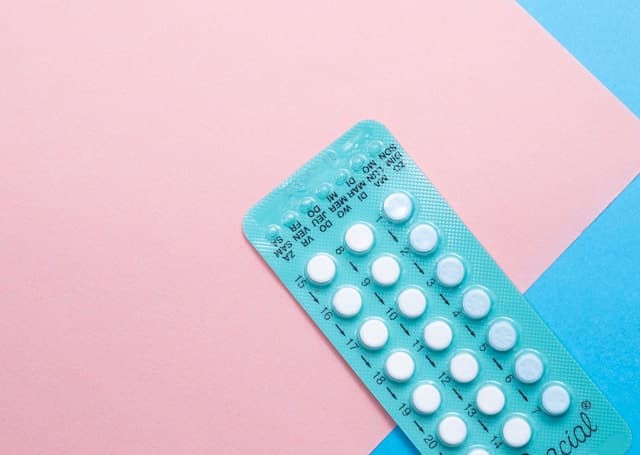SHARE
Acne is a common skin condition we have all faced at some point. Hormones cause it, clogging pores with oil or dead skin cells and forming pimples, blackheads, or whiteheads. But what is the connection between hormones, birth control pills, and acne?
Androgens, which are responsible for sebum production (a waxy, oily substance), are present in both men and women. High levels of androgens cause acne.
At times, birth control pills can cause acne. A contraceptive pill is commonly a medication taken by women to prevent pregnancy.
It contains synthetic hormones, either progestin alone or a combination of estrogen and progestin, that prevent ovulation (the release of an egg from the ovaries). The contraceptive pill is one of the most popular and effective methods of birth control when taken correctly.
Contraceptive pills can sometimes cause acne in some women, but they can also improve acne in others. The effect of contraceptive pills on acne depends on the type of pill and the individual’s response to it.

Start Birth Control Today!
Safe and reliable contraceptive pills tailored to your needs.
Get OCP Consultation
Start Birth Control Today!
Safe and reliable contraceptive pills tailored to your needs.
Get OCP ConsultationCan Contraceptive Pills Cause Acne?
If you’ve heard that oral contraceptives can potentially worsen or cause acne, here’s the reason.
When a woman takes an oral contraceptive pill, it often takes some time for its hormone-regulating effects to manifest fully. During this adjustment period, hormonal fluctuations occur, increasing androgen levels and acne.
However, as time progresses, the birth control pill stabilizes hormone levels, which can help improve acne.
Additionally, certain oral contraceptives, particularly those containing only progesterone, often referred to as the “mini-pill,” might contribute to increased acne.
The absence of estrogen in these pills can sometimes result in increased androgen levels, which can trigger hormonal acne.
Some pills can help reduce acne by decreasing the production of sebum. These pills are often prescribed to treat acne in women. In some cases, starting or stopping birth control pills can also trigger acne breakouts.
It’s essential to consult with a healthcare provider to discuss the best contraceptive option for you, especially if acne is a concern. They can help you choose a pill that is less likely to exacerbate acne or recommend alternative acne treatments if needed.
Maintaining a good skincare routine, eating a balanced diet, and managing stress can help manage and prevent acne.

Start Birth Control Today!
Safe and reliable contraceptive pills tailored to your needs.
Get OCP Consultation
Start Birth Control Today!
Safe and reliable contraceptive pills tailored to your needs.
Get OCP ConsultationWhat Are the Causes of Acne?
Acne is a skin condition when hair follicles become clogged with oil and dead skin cells. The exact cause is unknown, but certain factors are believed to cause acne.
Here are some of the leading causes and contributing factors to acne:
Excess Oil Production: The sebaceous glands in the skin produce an oily substance called sebum. Excess production of sebum can lead to clogged pores and acne.
Clogged Pores: Dead skin cells accumulate and mix with excess sebum, forming plug-in hair follicles. This can create an environment for bacteria to grow, resulting in inflammation and acne.
Bacteria: Some bacteria live on the skin and can contribute to the development of acne, leading to clogged pores.
Hormonal Changes: Fluctuations in hormone levels, especially during puberty, menstruation, pregnancy, and certain medical conditions like polycystic ovary syndrome (PCOS), can increase sebum production and contribute to acne.
Medications: Some medications and drugs containing androgens or lithium can cause or worsen acne.
Diet: Although the link between diet and acne is not fully established, some studies suggest that certain foods, such as dairy products and high-glycemic foods, may trigger acne in some people.
Genetics: If your parents or siblings have a history of acne, you may also be more susceptible to developing it.
Stress: Chronic stress can trigger hormonal changes that may worsen acne in some people.
Environmental Factors: Exposure to environmental factors like pollution and high humidity can contribute to acne by increasing sebum production and clogging pores.
Friction or Pressure on the Skin: Wearing tight clothing or using equipment that puts pressure on the skin can trigger acne, particularly on the face, neck, and back.

Talk to a Doctor Online
Reliable contraceptive options tailored to your lifestyle.
Book Telehealth Now
Talk to a Doctor Online
Reliable contraceptive options tailored to your lifestyle.
Book Telehealth NowWhat Are The Alternative Treatments for Acne?
Multiple approaches to treating acne exist, and the most suitable one depends on the root cause of your breakouts.
If you are suffering from acne, it is best to get medical advice to examine your skin type and the cause of your acne. A doctor will devise a tailored treatment to address your symptoms.
The doctor might suggest:
- Topical treatments
- Antibiotics
- Oral contraceptive pills
- Laser therapy
- Light therapy

Start Birth Control Today!
Safe and reliable contraceptive pills tailored to your needs.
Get OCP Consultation
Start Birth Control Today!
Safe and reliable contraceptive pills tailored to your needs.
Get OCP ConsultationConclusion
While birth control pills can sometimes trigger acne due to hormonal fluctuations, they can also be beneficial for some people by regulating hormone levels.
Before taking the contraceptive pill, it is best to consult a healthcare provider to find the right pill or learn about its side effects that minimize acne risks and consider alternative acne treatments if needed.
If you are feeling discomfort, you can schedule an appointment from home and comfortably discuss your concerns with a doctor.

